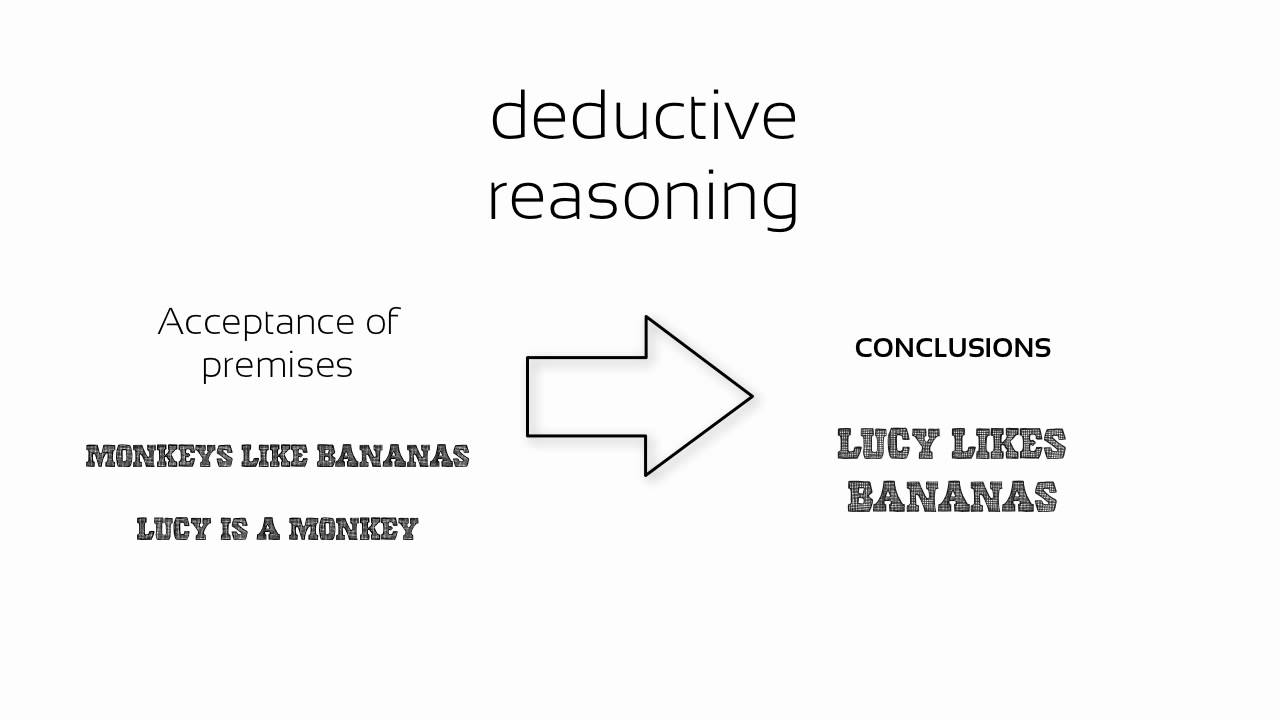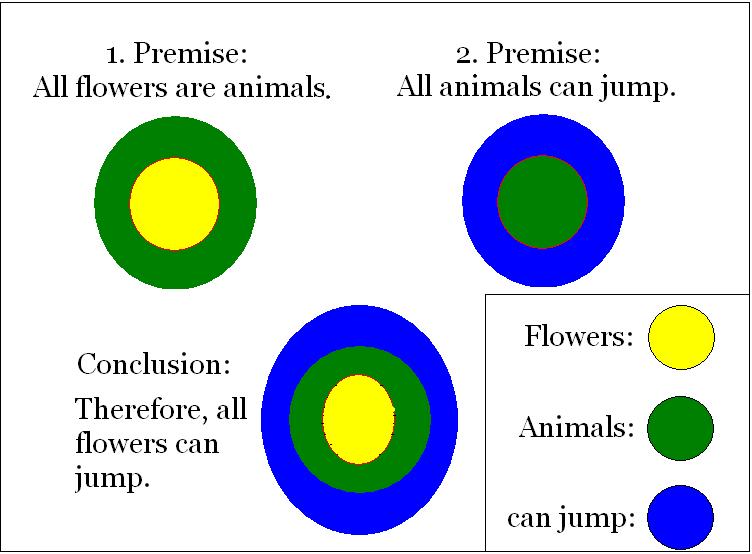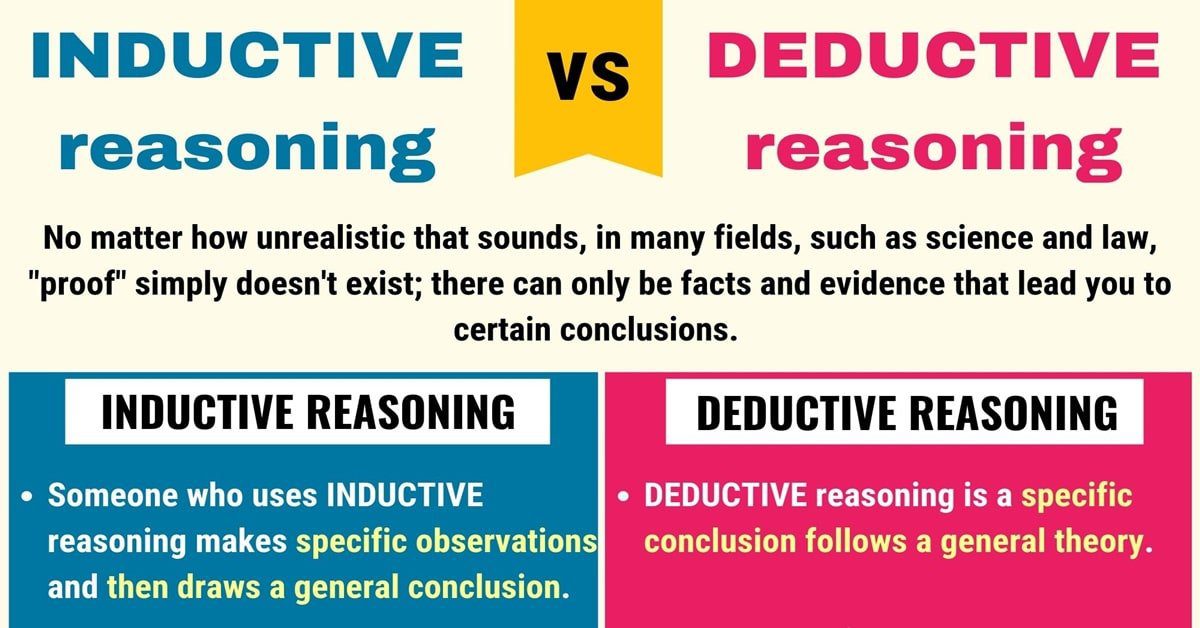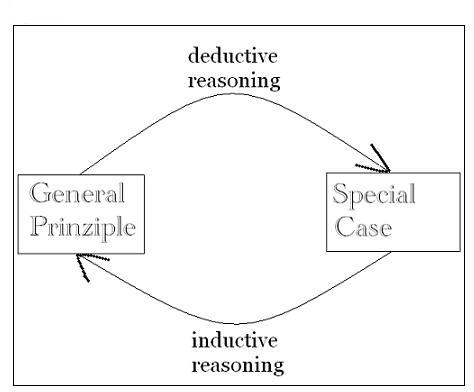Everyone uses deductive reasoning in their day-to-day lives. We use it when we make our morning coffee, or when we plan out a work break.
Deductive reasoning is a type of logical thinking that involves using what we know to come up with an answer.
For example, if I want to prove that it will rain tomorrow, I would need to have data points such as past predictions about rainfall or meteorological studies in order to show that there’s a correlation between these variables and future weather events.
Deductive reasoning can be used in many different areas, from math to law, but the most common place you will see deductive reasoning being done is in logic.
If you’re looking for a way to improve your reasoning skills, then deductive reasoning might be the best place to start.
DEDUCTIVE REASONING
What Is Deductive Reasoning?
Deductive reasoning is a form of logical thinking that involves drawing conclusions from given premises.
Deductive reasons are often used in mathematics, economics and engineering to prove or disprove theories.
To understand deductive reasoning, you need to first know what a premise is, which can be defined as an assumption made without evidence.
For example: “All elephants have four legs.” The truthfulness of this premise cannot be proven right now because we don’t have all the information yet; it’s just an assumption.
Deductive reasoning is our Sherlock Holmes-style tool, a logical process where conclusions are based on premises—assumptions or facts we consider true.
It’s a classic method of arriving at a definite conclusion by starting with a general statement, then applying it to specific cases.
Throughout this article, we’ll unpack how deductive reasoning works and why it’s a staple in critical thinking and scientific inquiry.
Get ready to understand how we use this powerful form of logic to solve problems and make sound decisions every day.
What Is Deductive Reasoning
Deductive reasoning is the backbone of problem-solving in a wide array of fields, from scientific research to legal analysis.
We start with general principles and move toward a specific conclusion, thereby crafting a narrative that’s both logical and defensible.
In essence, it’s like directing a film – we begin with a comprehensive script (our general theory) and then carefully direct scenes (specific instances) to ensure the storyline follows the intended path.
The efficacy of deductive reasoning hinges on the initial premises.
If they’re sound, we’re on the road to a reliable conclusion.
Our day-to-day decisions often rely on this method of thinking, though we may not always be conscious of it.
Take for example, when we determine the best camera angle for a scene in Citizen Kane.
We draw from the general understanding of camera techniques to decide on the specific placement that conveys the right mood.
Industries that revolve around stringent structures and rules, such as programming or mathematics, lean heavily on deductive reasoning.
Here are some key sectors where deductive reasoning is crucial:
- Information Technology,
- Engineering,
- Healthcare,
- Law Enforcement.
This form of reasoning doesn’t just live in the realms of logic or science fiction films like The Matrix.
It’s integral to the creative process behind every gripping story and well-constructed plotline we bring to life on screen.
When we lay out a narrative, our primary aim is to ensure that each sequence logically follows from the last, much like how each conclusion in deductive reasoning follows from its premises.
The Principles Of Deductive Reasoning
When we embrace the principles of deductive reasoning, we tap into a logical process that starts with a general idea and narrows down to a specific conclusion.
This methodology relies heavily on the validity of the initial premise – if it’s true, the conclusion must also be true.
The structure of deductive reasoning can be broken down into three key components:
- Major Premise – a general statement or belief that is widely acknowledged as true.
- Minor Premise – a more specific statement that relates to the major premise.
- Conclusion – the logical result when the major and minor premises are combined.
In storytelling within film like Inception, deductive reasoning allows us to craft narratives that resonate with universal truths, then apply them to individual scenarios.
It’s about taking the broad and making it personal, guiding the audience through a logical progression to achieve a compelling story arc.
It’s vital to note that deductive reasoning can be misled by initial assumptions that seem credible but are, in fact, false.
This premise accuracy is as critical in filmmaking as it is in fields such as science or mathematics.
Ensuring that our starting point is valid means our narrative conclusion will hold water.
As filmmakers, we apply deductive reasoning in various stages of production.
From developing the script to editing the final cut, each step often uses a deductive approach:
- Scriptwriting – Defining the overarching theme and building character arcs.
- Directing – Conveying a broad vision into actual scenes and performances.
- Editing – Paring down footage to create a coherent and impactful story.
Recognizing the significance of deductive reasoning not only improves our storytelling but also enhances our critical thinking skills.
It’s the unseen guide that ensures our creative endeavors align with a logical foundation, making the end product as believable as it is engaging.
Key Components Of Deductive Reasoning
Understanding the structure of deductive reasoning involves recognizing its key components – each serving a purpose to form a logical conclusion.
The framework includes three integral parts – major premise, minor premise, and the conclusion derived from the two.
The Major Premise establishes a generalization or an universal concept that sets the stage for further reasoning.
Think of it as the establishing shot in a film like The Godfather that introduces the viewer to a time, place, or theme from which the story unfolds.
The Minor Premise provides a specific instance related to the major premise.
It narrows the focus, much like a scene where Michael Corleone’s loyalty to his family is detailed, hinting at the pivotal roles he’ll play.
From these two premises, a Conclusion logically follows – the essence of deductive reasoning.
If our major premise is all mafia families have a code of honor and our minor premise is the Corleone family is a mafia family, then our deduction leads us to believe that the Corleone family adheres to a code of honor.
To ensure clarity in the process, here are essential steps to solidify the reasoning:
- Clearly define the premises.
- Ensure that the premises are statements of known facts or widely accepted beliefs.
- Establish a link between the premises.
The application of these components is not just for storytelling in classics like Citizen Kane but extends to the way we structure narratives and analyses in our projects.
With each new film we direct or script we write, these principles become an invisible guide enhancing our craft.
In film production, these steps overlap with various stages:
- Script and concept development align with defining general principles.
- Production decisions reflect specific applications.
- Editing and final cut represent drawing conclusions from the established footage and narrative threads.
Leveraging deductive reasoning enriches the lifelike qualities of our characters and plotlines, making them resonate with audiences on a deeper level.
Through this lens, our stories aren’t just seen; they’re experienced as logical sequences of cause and effect.
Examples Of Deductive Reasoning
Deductive reasoning plays a pivotal role in how we approach filmmaking.
It shapes the entire process, from pre-production to post-production.
In scriptwriting, a screenwriter might use the following deductive argument – if a character desires redemption (major premise), and they are presented with a challenging situation that can lead to redemption (minor premise), they’ll likely take on that challenge (conclusion).
This logical structure helps in developing compelling story arcs.
When directors are on set, they also rely on deductive reasoning.
They know that certain lighting techniques elicit specific emotions.
So if the scene requires a feeling of intimacy (major premise), they may use soft lighting to convey closeness and warmth (minor premise), enhancing the desired emotional effect without explicitly stating it.
This method is powerful in creating atmospheres that resonate with the audience.
Editors too Use deductive reasoning in their workflow.
They understand a film’s pacing can greatly influence the audience’s perception.
Fast paced editing (major premise) increases tension and excitement (minor premise), which is ideal for action sequences.
By applying this reasoning, editors can craft scenes that keep viewers on the edge of their seats.
also, deductive reasoning is key in the decision-making processes behind-the-scenes:
- When determining the film’s budget – high production value often translates to a bigger budget but can mean greater audience appeal.
- Selecting the cast – a well-known actor might bring more viewers, but they must also fit the character profile to be credible in the role.
- Choosing a release date – understanding market trends and competing titles can dictate the optimal time for cinema premiere, aiming to maximize box office returns.
In these ways, the use of deductive reasoning influences various dimensions of filmmaking, guiding us toward creating a product that not only fulfills artistic vision but also anticipates and satisfies audience expectations.
The Role Of Deductive Reasoning In Critical Thinking And Scientific Inquiry
Deductive reasoning has always been foundational to critical thinking and scientific inquiry.
It equips us with the tools to draw specific conclusions from general information, which is vital when rigorously testing hypotheses and theories.
Relying on deductive reasoning, scientists can accurately predict outcomes of experiments and researchers can establish firm conclusions.
In a sense, deductive reasoning turns the wheels of scientific progress.
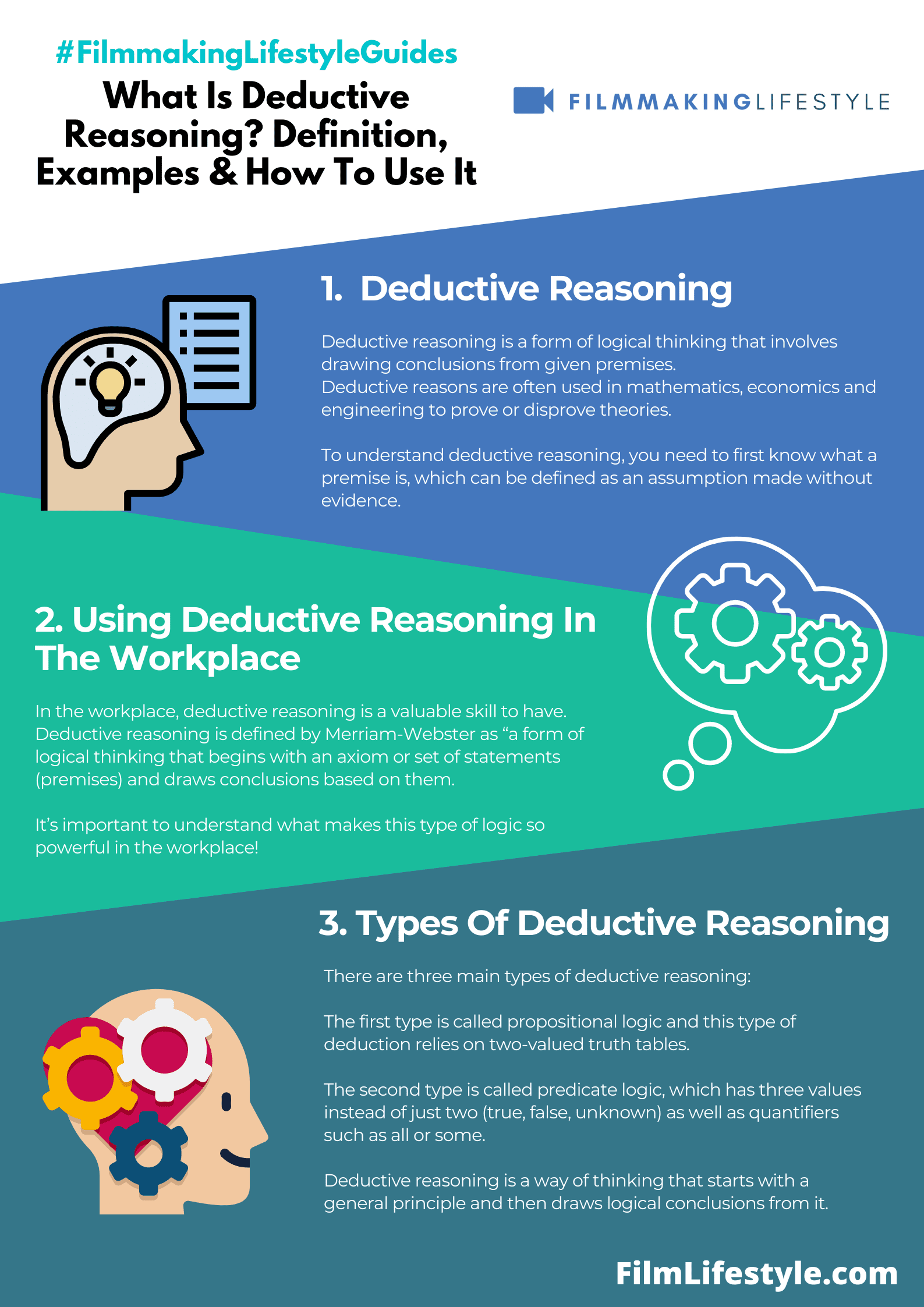
In the realm of critical thinking, this form of reasoning sharpens our ability to analyze arguments and propose reasoned solutions.
We’re led to articulate premises that are both clear and logical.
The following points outline how deductive reasoning is employed effectively within these domains:
- Formulating testable hypotheses – ensuring that scientific predictions are deductively valid.
- Evaluating the strength of arguments – separating sound arguments from fallacious ones based on the structure.
- Assuring consistent reasoning – in fields like law and ethics, deductive reasoning allows us to apply rules and principles fairly and universally.
From The Matrix to Inception, the power of deductive reasoning is showcased not just in real-life application but also in our very narratives and storytelling techniques.
Through these means, we’re able to explore complex themes and construct intricate plots that resonate with universal truths.
Whether we’re behind the camera or analyzing data in a lab, our use of deductive reasoning forms the backbone of impactful, well-founded decision-making.
Its application extends to the editing suite where every cut is a decision informed by previous choices – a clear showcase of deduction in action.
As we continue to jump into the intricacies of filmmaking, it’s important to recognize the subtle yet profound influence of deductive reasoning.
It not only drives the discourse of our times but also helps us create film experiences that tap into the very essence of human cognition and understanding.
What Is Deductive Reasoning – Wrap Up
We’ve explored the multifaceted applications of deductive reasoning, underscoring its value across disciplines.
It’s our bridge from established principles to new discoveries, guiding us through complex legal systems and enriching storytelling in cinema.
Deductive reasoning sharpens our critical thinking, ensuring we make informed, logical decisions.
As we continue to encounter challenges and opportunities, it’s this form of reasoning that will remain a cornerstone of human intellect and progress, nurturing our innate desire to understand and innovate.
Frequently Asked Questions
What Is Deductive Reasoning?
Deductive reasoning is a logical process where conclusion is based on the concordance of multiple premises that are generally assumed to be true.
It’s a form of critical thinking that starts with a general statement or hypothesis and examines the possibilities to reach a specific, logical conclusion.
Why Is Deductive Reasoning Important In Critical Thinking?
Deductive reasoning is a fundamental component of critical thinking as it allows individuals to develop conclusions based on logically sound arguments.
It encourages thorough analysis and helps prevent the acceptance of unfounded claims, leading to more reliable and valid judgment.
How Does Deductive Reasoning Assist In Scientific Inquiry?
In scientific inquiry, deductive reasoning is used to form testable hypotheses from established theories.
It guides researchers in crafting structured experiments and deducing implications from theoretical models to empirical testing, thereby advancing scientific knowledge.
What Role Does Deductive Reasoning Play In The Legal System?
In law, deductive reasoning ensures that legal decisions are based on established principles and previous judgments.
It’s crucial for interpreting legislation consistently and applying laws to different cases in a systematic and unbiased manner.
Can Deductive Reasoning Be Applied To Filmmaking?
Yes, deductive reasoning applies to filmmaking in scriptwriting, story development, and editing.
It helps filmmakers create compelling narratives by ensuring that plot developments stem logically from established storylines, which contributes to coherent and engaging films.
How Does Deductive Reasoning Influence Decision-making?
Deductive reasoning influences decision-making by providing a structured approach to considering consequences and implications.
It helps to ensure that decisions are thought-through, rational, and consistent with existing facts and principles, leading to more impactful outcomes.

